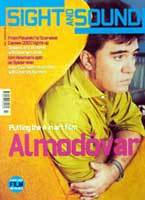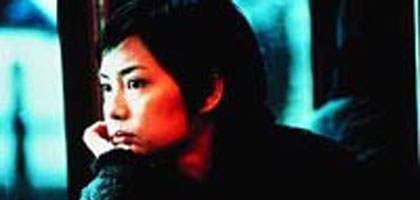
What Time Is It There?
France/Taiwan/Italy 2001

Reviewed by Tony Rayns
Synopsis
Our synopses give away the plot in full, including surprise twists.
Hsiao Kang (Li Kang-Sheng) lives with his parents in a dingy Taipei apartment and earns a living selling cheap watches on the street. Soon after his father's death and funeral he is approached by Shiang-Chyi, (Chen Shiang-Chyi) a young woman about to leave for Paris, who wants to buy a two-time-zone watch and insists on having the one Hsiao Kang is wearing. He warns her it comes from a house of mourning (and so may bring bad luck), but eventually sells it to her.
Hsiao Kang is increasingly irritated by his mother's expectation that her late husband's spirit will return to the apartment and be reincarnated in some form. His exasperation boils over when she shrouds the windows with black cloth, believing that the spirit is present but in a different time zone. On impulse, he asks a pirate-video stallholder for a tape showing Paris; he watches Truffaut's Les Quatre Cents Coups with fascination.
Reluctant to deal with his mother (Lu Yi-Ching), he begins roaming Taipei, resetting every public clock within reach to Paris time. His wholesaler supplies him with a new line of "unbreakable" watches. He is sexually propositioned by a man who sees him tampering with a clock in a cinema. He eventually seeks some release from his frustrations by visiting a prostitute (Tsai Guei).
Meanwhile in Paris Shiang-Chyi feels lonely and helpless. Jean-Pierre Léaud chats her up in a cemetery. She encounters a French-speaking Chinese woman while struggling with a restaurant menu and checks out of her hotel to stay in the woman's apartment. But her sexual overture during the night is rebuffed and she sneaks out in the early morning. While she dozes on a park bench in the Tuileries, some kids take her suitcase and float it in the ornamental lake. It is retrieved by a passing stranger - who looks uncannily like Hsiao Kang's father.
Review
What Time Is It There? is a perfect paradox: hermetic but open, blank but expressive, grim but droll. It picks up almost exactly where Tsai Ming-Liang left off in The River, with the same cast in more or less the same roles (the actress formerly known as Lu Xiaolin, who plays the mother, has changed her name to Lu Yi-Ching, apparently for superstitious reasons), a similar focus on grungy daily routines and another intricate pattern of cross-cutting which suggests 'mystical' links between seemingly unrelated events. There are two key differences between this and the 1996 film: the emphasis on bereavement and mourning, and the splitting of the action between two continents. Both differences have led Tsai to think about time, as signalled in the title.
As usual in his later films, Tsai sets out the terms of his conundrum with deadpan wit and undercurrents of dark humour. The notion of 'time difference' - the seven hours that separate Taipei and Paris in winter - yields the string of sight gags in which Tsai's fetish actor Li Kang-Sheng roams Taipei resetting clocks to Paris time. (Since there is no plot as such, the escalating risk and absurdity of this quest provide the momentum needed to carry the film through its entire central section.) But the film also proposes at least two other ways of thinking about 'time difference'. One is the gap between youth and old age, embodied here by Jean-Pierre Léaud, who appears as the young Antoine Doinel in a Truffaut clip and as 'dubious old man in cemetery' when he gives his phone number to the defenceless Shiang-Chyi. The other is the gap between the living and the dead, embodied in the mother's batty idea that her late husband's spirit has come home in a different time zone - an idea obliquely confirmed by the film's enigmatic ending.
The only material link between Hsiao Kang in Taipei and Shiang-Chyi in Paris is a wristwatch that shows two time zones; it may or may not also house the wandering spirit of Hsiao Kang's father. From this one small object, Tsai extrapolates both the parallels which structure the cross-cutting (a modern columbarium in Taipei, a 19th-century cemetery in Paris; a road-killed dog in Taipei, steak tartare in Paris, and so on) and the Big Idea which permeates the film: the possibility that reincarnation may be (a) literally true, (b) poetically credible, or (c) a valid metaphor for the process of coming to terms with bereavement. By design, the film ends with a symmetrical shot of a perfect circle - actually the millennium ferris wheel by the Tuileries - connoting both narrative closure and the wished-for fantasy of cyclical return.
This ending is curiously satisfying, and it certainly encourages the viewer to look back over the film with changed eyes. But it doesn't entirely mitigate the sense that Tsai may be ploughing the same furrow once too often. Tsai has starrier technical collaborators this time around (cinematographer Benoit Delhomme, Oscar-winning production designer Tim Yip), but the performances, visual style, pacing and structure here are all very much like The River and The Hole. So similar, in fact, that it becomes slightly too easy to enumerate the characteristics of a Tsai Ming-Liang movie.
The aesthetic ambition is obviously Beckettian: Tsai's characters are all fundamentally alike in their isolation, inarticulacy and frustration. They are all locked in private hells and prone to manias. Their heterosexual impulses lead to energetic but joyless couplings which change nothing. Their homosexual impulses lead to failure, guilt and shame. (This last is odd coming from the openly gay director whose Aids-awareness video My New Friends was so engaging.) Their motives, thanks to avowedly "Bressonian" performances from professional and non-professional actors alike, remain secret - or rather, remain open to interpretation by anyone who can decode their expressions and body language.
Since Taiwan's film industry died, Tsai's ability to raise funding for his projects has rested on his skill at building and retaining a reputation as a distinctive auteur; hence the uniformity of his recent work. But for all its pleasures, What Time Is It There? suggests that a reinvention is overdue.
Credits
- Director
- Tsai Ming-Liang
- Producer
- Bruno Pesery
- Screenplay
- Tsai Ming-Liang
- Yang Pi-Ying
- Director of Photography
- Benoît Delhomme
- Editor
- Chen Sheng-Chang
- Production Designer
- Yip Kam Tim
